Katelyn Buxton's Blog, page 3
May 1, 2018
April Book Reviews
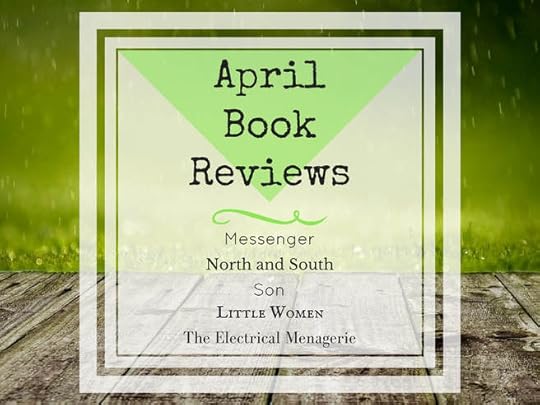 April was an extremely productive reading month for me. I don't know whether it was my Goodreads challenge saying I was [gasp] one book behind schedule after spending a month on Les Mis, or the fact that some of these are short stories, but at the end of it I had too many reads to fit into one blog graphic. The five on the picture above are only the full-length novels I read. In addition to Messenger, North and South, Son, Little Women, and The Electrical Menagerie, I also read Arbrook Huxley and the Star-Crossed Lovers, and The Lady of Thorns, both of which being short stories, are available for free by signing up for their authors' respective newsletters.
April was an extremely productive reading month for me. I don't know whether it was my Goodreads challenge saying I was [gasp] one book behind schedule after spending a month on Les Mis, or the fact that some of these are short stories, but at the end of it I had too many reads to fit into one blog graphic. The five on the picture above are only the full-length novels I read. In addition to Messenger, North and South, Son, Little Women, and The Electrical Menagerie, I also read Arbrook Huxley and the Star-Crossed Lovers, and The Lady of Thorns, both of which being short stories, are available for free by signing up for their authors' respective newsletters.
Messenger
Lois Lowry
My rating: ★★★★
Odd as it is, I feel like Messenger did a better job of hearkening back to The Giver than Gathering Blue, merely by putting us inside the head of another likeable male protagonist. Matty, (Matt, in the previous book), is almost all grown up now, but beginning to discover something about himself that frightens him. Something that he doesn’t understand—something that could potentially effect great change in his world.
Other than that, Messenger’s plot follows an entirely different trajectory than that of its predecessors. In the previous two books things were bad, and things that seemed good were not really very good at all. There’s a growing sense of unease—a dull horror that things are not what they seem—building up to a better ending. With Messenger, things start out just the way they should. Life is good in the Village. People share, and don’t discriminate between others just because they’re disabled in some way or another. From there, it gradually travels downhill. The mysterious Trade Mart has people trading away their inner selves and becoming selfish, and only receiving silly stuff in return, like velvet-covered furniture, an improved complexion, or an old slot machine that spits out candy. But what can be done about it? Trades are forever. That's where Matty comes in.
Matty is like Jonas in a lot of ways. He’s just beginning to grow up, and realize that there is more to the world than meets the eye. He’s good-hearted, and willing to sacrifice himself for others if necessary. He’s even beginning to experience the stirring of new power within himself, just like Jonas—Jonas could “see beyond,” The Giver could “hear beyond,” and Matty—well, he can fix a frog. (His words, not mine, folks.) He can heal things just by touch. His old friend Kira has the almost supernatural gift for weaving, and Thomas for carving. Matty can heal.
That healing power makes the climax of this book spectacular, and I’ll leave it at that. I noticed that it is a little brief this read-through, but it utterly wrecked me the first time I read it. Prepare yourself for feels—that’s all I have to say. :P
If you liked The Giver, I think you'll like Messenger. As always, Lowry builds the suspense until the very end, and leaves me wanting more. ~~~~~~~~~~~~~~~~~~~~~~~~~~~~~~~~~
Arbrook Huxley and the Star-Crossed Lovers
Mollie E. Reeder
My rating: ★★★★★
Arbrook Huxley and the Star-Crossed Lovers is a hilarious, witty, absurd steampunk adventure, filled with vibrant, likeable characters that fall into unfortunately awkward circumstances. I don’t remember the last time I was so close to laughing out loud—repeatedly—while reading a book. Reeder’s dry sense of humor is reminiscent of Dickens’s, but with a modern twist, and none of his rambling. :P
Agatha Pleasant: I loved this girl. She reminded me a lot of Catherine Morland from Northanger Abbey. She’s bookish, likes to read “invigorating” stories, (much to the chagrin of her straitlaced aunt, who’s the epitome of such characters in classic fiction), and a romantic at heart. What’s not to love?
Arbrook Huxley: This man was the victim of a Series of Unfortunate Events, which I won’t spoil for sake of… well… spoilers. But it involves self-replicating mechanical doves, good intentions, misunderstandings, and running a mile and looking like it too. I liked him a lot. The poor guy had a really terrible day. :P
Perhaps the only thing I didn’t like about the book was how the ending felt a bit rushed, and everything wrapped up a little too perfectly (for Agatha at least). And there were mentions of “groping,” “voyeurs,” and being violated. (All of which were immensely exaggerated—a man touched a woman’s knee completely by accident, and a long-time friend was seen looking into a window.)
But these are small critiques. Arbrook Huxley and the Star-Crossed Lovers is a wild ride into a realm that I can’t wait to reenter. I have to say that I was genuinely disappointed when I realized that the first book in the series wasn’t for sale yet! I will definitely be looking out for more by Reeder. In the meantime, however, take my advice and read this short story. ;) It's a whole lot of fun.
~~~~~~~~~~~~~~~~~~~~~~~~~~~~~~~~~
North and South
Elizabeth Gaskell
My rating: ★★★★
[Some spoilers ahead!]
If you’re wondering what North and South is about, think Pride and Prejudice, minus Mr. Collins and four out of five Bennet sisters, plus a Wickham that isn’t really so bad at all, and set in the thick of a smoky, dirty, industrial manufacturing town called Milton.
Margaret Hale and Mr. Thornton have a very Lizzie Bennett/Mr. Darcy vibe to them, which I love. Margaret is one of the strongest female characters that I’ve seen in classic fiction, (albeit with one or two fainting fits to prove she’s not invincible xD), and Mr. Thornton is a misunderstood cinnamon roll. Margaret also isn’t afraid to cry—even if she does it in secret—because neither of her parents could bear the full strain of the problems Gaskell dumped into their poor, fictional, laps. She grew up very quickly—something that reminded me a little of Jane Eyre.
Although North and South can be compared to Pride and Prejudice, the resemblance to anything Jane Austen ceased, however, the moment the second person died. The death count in this book is astonishing, for what it is—a familiar, sweet romance that’s a touch melodramatic—but that just adds to it’s old-fashioned charm. I counted seven deaths total, but I’ll spare you the details. I thought that I was a little bloodthirsty as an author, but Gaskell must have aspired to be Victor Hugo. xD
Probably the only thing I didn’t like was the pacing. It felt really uneven—dragging on at a moderate pace for a while and then zipping forward hours or even days in the space of one paragraph, before lurching to a stop again. [Spoilers!] Because of that, Mr. Thornton and Margaret were not reconciled until the last few pages, and that was it. It was over. The book was done. One of my frequent complaints with Jane Austen is her abrupt endings, but Gaskell took them to a whole new level. Another small gripe I have is that North and South was a little vague at times. I never really figured out why Margaret's father left the church? Also: the politics. I am not a particularly political-minded individual, so I’m sure a lot of it went over my head, and can’t speak for what others may think. What I did like, however, was how the book looked at both sides of the industrial equation—both from the factory masters’ view at the top of the totem pole, and from that of the poor “hands’”—the workers in those factories.
In short, North and South delivers the same tried-and-true brand of vintage romance that satisfies—without sacrificing cleanliness—while taking a hard look at the industrial age at the same time. I’d been wanting to read it for a while, and now that I have, I’m glad I did.
~~~~~~~~~~~~~~~~~~~~~~~~~~~~~~~~~
The Lady of Thorns
Kyle Robert Shultz
My rating: ★★★★★
“You blithering idiot!”
In The Lady of Thorns we are introduced to another parallel reality in the Afterverse—one in which many things are the same—except for the fact that all of the characters we’ve come to know and love are gender-swapped. That said, the above quote was when I realized that Nicola was still very much Nick, and when Cordell whipped out his chalk I knew that Cordelia was definitely still in the story.
It’s a hilarious romp, hailing mostly from The Beast of Talesend days, and I laughed out loud more than once. There are many Easter eggs for those who have read the previous books, and reimagining the storyline and group dynamics surrounding our favorite Beaumonts and Beasleys was a lot of fun. (Also, can we just take a moment to appreciate the constable, who wins the Biggest Underreaction award? The man needs an entire short story dedicated to himself.) xD
Once again, Shultz does not disappoint. If you’ve enjoyed any of the previous books, then what are you waiting for?? Go read it!
~~~~~~~~~~~~~~~~~~~~~~~~~~~~~~~~~
Son
Lois Lowry
My rating: ★★★★★
Son tells the story of a mother’s love for her child, and a determination to continue loving him, even when her whole society tells her she shouldn’t.
When I first read this book, for some reason it never really clicked. Given the subject matter (Claire’s assignment as Birthmother in the community Jonas is from), and her subsequent love for the son she gave birth to, there are a lot of births in this book. Maybe too many? However, that fact never lets us stray far from the end goal: for Claire to be reunited with her son. Everywhere she goes she’s reminded of him, and nothing can stop her from getting there.
As always Lowry’s writing style is extremely streamlined, but it seems to pack more of a raw punch in Son. Her descriptions of Claire’s joyful pain as she held her son and looked down on him—watched him smile and laugh, even while she knew no one could ever know that she was his mother—was achingly well-written. Motherhood can be one of life’s greatest joys, but losing a child is one of life’s deepest sorrows. Lowry got at both of these points with the experience of someone who knows exactly what both feel like.
Another thing I loved was that we get to see a little more of some of our old friends from The Giver. That in itself is worth a whole star in my book! :P
One of the few things I didn’t like this read-through was that the ending was a little abrupt, and even though I’m a lot more tolerant of all the babies being born this round than I was last, there still seems to be enough births for at least four books, not just one. (I mean really.) And as far as content goes, Claire was impregnated by artificial insemination, (as are all Birthmothers), there’s a few passing mentions of “coupling,” and “making love,” and asking “where babies come from.” (The latter being a question no one thinks to ask in the community where Claire grew up.) There’s also one solitary “b----y.”
That said, I upped the rating from four stars to five after reading it again, because I was able to connect with Claire. I find it really hard to get engaged in a book without connecting to the characters in it, and Claire gave me that connection when I slowed down and began to appreciate her complexities. The final verdict? Son is a masterful end to a wonderful series.
~~~~~~~~~~~~~~~~~~~~~~~~~~~~~~~~~
Little Women
Louisa May Alcott
My rating: ★★★★★
[Some spoilers ahead!]
When I first read Little Women, I was eleven—and every inch Jo March, including the fact that I was allergic to “lovering” in all forms, even in books. I found reading about the Marches to be insufferably boring, and the only thing I really remember approving of was Jo’s scandalized outburst when Meg and Mr. Brooke got engaged: “Oh, do somebody go down quick! John Brooke is acting dreadfully, and Meg likes it!”
However, along about sixteen or seventeen I’d undergone an expansion in the openness of my mind towards such things, and decided to give it another shot. Well, I’m glad I did. I discovered Little Women to be a touching, sweet story of family, friendship, growing up, and trusting God even through the hard times, and even when our “besetting sin” seems never to get any easier to bear. Most of all, I felt as if all of the Marches and Brookes, Laurences and Bhaers were old friends by the end of it, and that’s something few books can replicate.
Now fast forward to the present, and after finishing round three, I love Little Women even more. The beautiful messages are still there. The March girls are each unique in their own way. It’s a quiet tale of growing up, and learning to bear our burdens, like Christian from Pilgrim’s Progress. There’s no loud or dashing adventures here—just a simple story of family love throughout the storms of life.
Also, can we just talks about the characters for a minute? Jo March always has and always will be my favorite of the sisters... from her tomboyish inclinations and burning to write, I find her to be a refreshing change. Meg is sweet, Beth absolutely beautiful in every way, and Amy a little conceited but learning to “sail her ship,” just like Jo. Laurie is an immensely likeable character, (and his and Jo’s friendship dynamic is one of my favorite things), Mr. Brooke a quiet but strong man, and Mr. Bhaer too good for this world.
There’s really nothing bad I can say about Little Women, except for the fact that perhaps the March girls would have been better served by daily Bible reading instead of daily Pilgrim’s Progress reading—but their motives were pure. This time I even found it hard to be mad that Jo turned Laurie down. I better understand the why of it now (although they’re hard not to ship), and I think that added a layer of realism to Little Women that few other books with romance delve into.
The characters are all varied and different, the prose insightful, the theme of growing up relatable, and the dialogue witty and heartfelt. In short, Little Women is a book everyone should read at least once. It’s one that will stick with me the rest of my life.
~~~~~~~~~~~~~~~~~~~~~~~~~~~~~~~~~
The Electrical Menagerie
Mollie E. Reeder
My rating: ★★★★★
~ I received a free advance review copy of The Electrical Menagerie, therefore all of the following opinions are my own ~
This book is absolutely magical in every way. This is the kind of book that swallows you up so thoroughly, you can’t stop thinking about it, even when you’re not reading. It’s heartfelt, imaginative, and filled with characters that I connected with from the very beginning. I knew after reading Arbrook Huxley and the Star-Crossed Lovers that I was in for a treat, but The Electrical Menagerie delivered—and then some.
Sylvester Carthage: This man is one of the most complex and well-developed characters I’ve seen in a while. There were a lot of times while reading his POV that I had to sit back and think, “Wow. That’s exactly what [that] feels like.” Even feelings I’d never consciously thought about. Reeder enabled me to connect with him from page one, and my sister will be the first to tell you that I got more than a little animated while telling her about him. He was strong in an extremely understated way—without even knowing it himself—and grew tremendously throughout the course of the book.
Arbrook Huxley: Huxley provided an effective foil for Carthage, who was a very morally upright character. Although he was a "good person" over all, Huxley was not averse to using underhand means to achieve desired ends from time to time. He’s also rather foulmouthed (in a made-up way), something that drives Carthage nuts—but over the course of the story, Huxley grew a lot, and learned to appreciate his quiet business partner by the end of the book. They both had something to teach the other, and I love that.
As for the world itself, I was constantly blown away by how well thought-out it was. I never had to scramble for a mental image, because Reeder always painted the picture in glowing colors. (And, unlike Tolkien, did not spend five pages lecturing on the state of the hills from all four points of the compass.) The murder-mystery side of the story had me constantly guessing, but there were enough personal battles to keep me engaged in that direction as well. I believed in Carthage and Huxley from the very beginning... even if they didn’t always believe in each other. Also, can I just say that Reeder got me attached to a robot? I mean really. The poor guy deserved better!
And now we come to the part of the review where I gripe at nitpicky things—except—I have nothing to gripe about. Maybe some of the tricks could have been explained a little better, and perhaps the first show in the book could have been elaborated on just a tad bit more, but other than that, I have nothing. All of the plot points were wrapped up in a neat little bow at the end, and nothing was left hanging. As for a content warning, there is quite a bit of drinking, and one character ends up rather drunk… but that only makes him incredibly sarcastic. Huxley’s habit of cursing doesn’t even count against the book, because every oath was made up!
In closing, I feel extremely privileged to have been able to enter the realm of The Electrical Menagerie. Thank you, Reeder, for providing me with an ARC of this marvelous book. I am looking forward to seeing more of Carthage and Huxley in the future!
Published on May 01, 2018 00:00
April 15, 2018
Honoring God with Your Writing
 Honor:
Honor:1 a : good name or public esteem : reputation
b : a showing of usually merited respect : recognition : pay honor to our founder
2 : privilege: had the honor of joining the captain for dinner
According to the Merriam-Webster dictionary, honor can be defined as a good name, the act of showing respect, or simply a privilege—a privilege to serve, or to be in the presence of someone greater than oneself.
If you’ve seen my blog post My Writing Testimony, you’ll know that I haven’t always honored God with my writing. For a long time I was in denial—I didn’t think that God could possibly use me—which is of course complete and utter nonsense. God can do whatever He wants. Still, I was a little selfish. I wanted to hang on to the gift He’d given me a little bit longer, and write the stories that I wanted to write. Besides, adding my faith into an already personal thing scared me.
What I didn’t know then was the fact that God has given us our gifts for a reason, and that reason is always to serve Him. He’s the author and finisher of our faith, and as such He always has and always will be the best storyteller in the universe. On the day that Jesus rose from the grave He gave us the biggest plot twist in the history of plot twists. Because of that, I want my pen to mirror whatever poor reflection of His glory that it can. And how exactly do I go about that? I try to start each and every writing or editing session by sending up a quick prayer for His guidance. I know that when I try to write in my own power, I just end up with a giant mess. (Believe me—take it from the girl who’s had to edit those same messes.) But when I start out admitting that I can't, but He can—and asking Him to give me the words to write, He always comes through. There is no sweeter form of worship than when we use our gifts for His glory.
Notice that I'm not going to offer a discourse on what a Christian can and can't write about. That is simply between you and God. If your heart is truly aligned with His, the rest will fall into place—and I don't think you'll end up with the fluffy stuff that predominates the Christian genre. With God's prompting, I've written about abuse, slavery, death, grief, injustice, hypocrisy, and war. There is a place for escapist fiction, but there's also a huge place for fiction that takes life's sorrows, faces them, and replies with real, tangible hope. Not the false hope that becoming a Christian will make life a bed of roses, but the hope that knows God will always be with them—even in the hard times. That He'll walk with them through the valley of the shadow of death.
"When you pass through the waters, I will be with you;
And through the rivers, they shall not overflow you.
When you walk through the fire, you shall not be burned,
Nor shall the flame scorch you."
Isaiah 43:2
"Have I not commanded you? Be strong and of good courage; do not be afraid, nor be dismayed, for the Lord your God is with you wherever you go.”
Joshua 1:9
"These things I have spoken to you, that in Me you may have peace. In the world you will have tribulation; but be of good cheer, I have overcome the world.”
John 16:33
I’m not perfect, and I certainly don’t pretend to be. I don’t know you, and I definitely don’t know what your writing journey has looked like. All I know is this: that God has given us our gifts for a reason, and He wants us to use them for His glory. When we align our hearts with His will, miracles happen.
Published on April 15, 2018 00:00
April 2, 2018
March Book Reviews
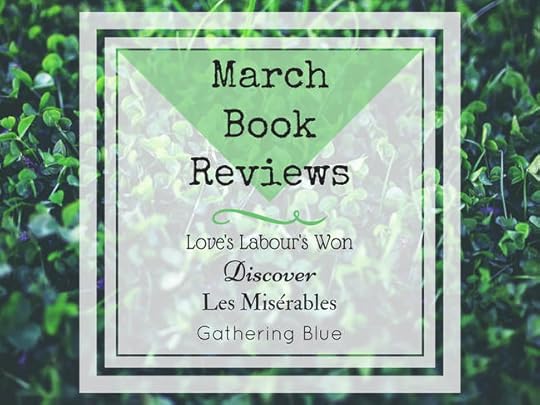 I have to apologize for the late post. I should've planned ahead a bit better, but as it was, the alignment of holidays really did my blogging schedule in. (No one would have taken it seriously if I posted it yesterday, anyway.) :P As usual, March brought its share of awesome reads my way. Love's Labour's Won and Discover are both short stories available for free through their authors' respective newsletters, Les Misérables was a beautiful but soul-crushing experience that quickly became one of my new favorites, and Gathering Blue was a re-read as I begin to revisit one amazing series.
I have to apologize for the late post. I should've planned ahead a bit better, but as it was, the alignment of holidays really did my blogging schedule in. (No one would have taken it seriously if I posted it yesterday, anyway.) :P As usual, March brought its share of awesome reads my way. Love's Labour's Won and Discover are both short stories available for free through their authors' respective newsletters, Les Misérables was a beautiful but soul-crushing experience that quickly became one of my new favorites, and Gathering Blue was a re-read as I begin to revisit one amazing series.Love's Labour's Won
Kyle Robert Shultz
My rating: ★★★★
One of the best things about anything Shultz writes is the wonderful sense of humor, and Love’s Labour’s Won is no exception. It stares sickly-sweet love tropes straight in the face, and while making subtle fun of them, Cordelia delivered a truth bomb during the climax that pulled it all together beautifully. (Cordelia, by the way, is quickly becoming one of my favorite fantasy heroines ever.) xD In short, Love’s Labour’s Won delivered the characteristic Beaumont and Beasley goodness we’ve all come to know and love.
~~~~~~~~~~~~~~~~~~~~~~~~~~~~~~~~~
Discover
Sarah Addison-Fox
My rating: ★★★★
Well that was adorable. I’m a sucker for sweet love stories, and this one delivered, let me tell you. *dies of cuteness* It tells the story of how Maggie and Ethan met—two characters that will be familiar if you’ve read any of the other Allegiance books. Stories like these are so refreshing in a world where lust gets labeled love so often. Ethan loves Maggie for who she is, and Maggie loves Ethan for who he is, end of story. I also liked getting to know a little more about Ethan’s past! I already knew some of Maggie’s, but this short story colored in Ethan’s character a little more vividly.
All in all, Discover is a quick read, a sweet read, and a worthy addition to the world introduced with the rest of the Allegiance series. ^_^
~~~~~~~~~~~~~~~~~~~~~~~~~~~~~~~~~
Les Misérables
Victor Hugo
My rating: ★★★★★
[Spoilers ahead!]
“It is nothing to die; it is dreadful not to live.”
Directly translated, Les Misérables means, “The Wretched.” Victor Hugo knew exactly what he was doing when he titled this magnificent monstrosity of a book. It takes an unflinching look at the lowest rungs of the French—and especially Parisian—social ladder during the early 1800’s, and brings back beauty.
Throughout the book there are themes of redemption, themes of injustice, and themes of love and self-sacrifice, which makes for a winning combination. Early on, Jean Valjean is shown Christ’s love in the form of the Bishop Myriel, which turns this galley-hardened ex-convict into one of my favorite characters ever. Jean had been sent to the galleys for stealing a loaf of bread to feed his sister’s children, but stayed there for nearly twenty years because of various escape attempts. He came out more animal than man, but when the bishop shined the light of God’s love into his life, everything changed. He repented, and from that moment on, he was a warrior for God. (Although he wouldn’t put it that way.) He was a voice for the unjustly accused, and over and over again showed the same compassion that the bishop had shown him.
Probably my second favorite character in the book was Baron Marius Pontmercy. Words fail to describe him. xD When telling my sister about something he did, I found myself saying simply, “Marius is being Marius again.” Marius was… Marius… a lot. The man was even dramatic while unconscious, you guys. *inserts GIF of Peggy Carter telling Cap he’s ‘always so dramatic.’* There was a scene where he chased a rat of a man named Thenardier out of his house by angrily throwing money at him, (in his father’s memory—Thenardier had once ‘saved’ his father’s life), and if that doesn’t tell you everything you need to know about Marius, I don’t know what does. He’s fiercely loyal to family, sensitive to a fault, loves passionately, and is the king of being dramatic. So, so, dramatic. xD
The only cons I have come in the frequent references to prostitution (there was one poor woman that became a prostitute out of desperation early in the book, but we only saw her pacing in the snow with a low-necked dress on), “hussy,” “jade,” “b----rd,” occasional taking of the Lord’s name in vain, and a general flippancy to getting married and staying faithful (especially on the part of Marius’s grandfather), that if there hadn’t been such a glowing theme of redemption and self-sacrifice in the form of Jean Valjean, I might have had to put the book down. That said, seeing these poor people driven to desperation by the circumstances of life made the aforementioned themes all the more powerful. I didn't agree with all of Hugo's theology, but his message that all could repent and be redeemed at the foot of the cross is one that everyone needs to hear.
Another, more minor con, is the resemblance of Les Misérables to Moby Dick. Victor Hugo delivered lengthy lectures on History (Waterloo), Language (Slang), Architecture (the Parisian Sewer System), and others—often right when I wanted to find out What Happened Next™. Everything had a point, but having to read a hundred pages of nonfiction every so often in the midst of his work of fiction was a little trying to my patience. In short, these detours are the reason it’s 1,200 pages long.
Looking back over my review, I realize that it barely even scratches the surface of this book. Les Misérables has an enormous cast of characters, and that, working together with increasingly complicated circumstances and symbolism made for some of the most pure, the most beautiful, the most honest and raw moments in literary history. Jean Valjean loved, and that was all. He loved the downtrodden and oppressed, he had mercy on his enemies, he even carried an injured young man miles through the Parisian sewer system at great personal risk just so that he’d have the chance to live. There was nothing in it for him—nothing at all—and if that doesn’t show a picture of what Christ did for us, I don’t know what does.
~~~~~~~~~~~~~~~~~~~~~~~~~~~~~~~~~
Gathering Blue
Lois Lowry
My rating: ★★★
Gathering Blue tells the story of a young orphaned girl named Kira, who is blessed with none of the usual “superpowers.” She can’t fly. She doesn’t have x-ray vision. She can’t even kick somebody’s tail with awesome karate moves. In fact, she's somewhat crippled by the twisted leg she was born with. “Well, what can she do?” you ask. She can weave. And that weaving, while not sounding incredible on its own, is a pretty spectacular ability. She doesn’t know how she does it—she just does. The patterns and colors come to her own their own, and she creates incredible designs.
One of the most impactful parts of the book (for me), comes from the theme of what makes an artist, followed up by what being an artist is like. Because really, when it comes down to it, being an artist is not all fun and games. There’s a lot of grinding out the necessary things when we’d rather be creating whole new worlds, or painting a new landscape, or writing a new song. Gathering Blue deals with that horrible feeling of having reached the bottom of the well of creativity—of having peaked. Harnessing creativity for work might just kill it. And yet—Kira the Weaver was given her gifts for a reason. Thomas the Carver was also. Even little Jo the future Singer was given her voice for a very special purpose. They were given their gifts to reshape the future—something that Kira realizes by the end of the book. And that's a message I can get behind.
Unfortunately, I’ve always had a difficult time connecting with Kira as a character. She always seems rather aloof, and for a long time that puzzled me—but I think it comes down to Lois Lowry’s writing style. The same minimalistic style that worked so well in The Giver, because it was utopian and no one had cause to feel deeply just didn’t work as well in Gathering Blue. Everything in Kira’s village is the polar opposite of Jonas’s, and yet she doesn’t seem to really feel. There were a couple times that she cried, and it caught me by surprise, even though this is the second time I’ve read it. Often, I thought the secondary characters were better developed than Kira... especially little Matt.
As for content, Kira’s people hold some weird beliefs surrounding births and deaths, there’s mention made of worshipping a cross (they’ve entirely forgotten why—never mind the fact that the cross shouldn’t be worshipped, only the Savior who hung on it), p--s, and naked children.
At first, as a sequel to The Giver, Kira’s village, with its noisy squalor, is kind of a jarring transition. But there’s that same growing sense that all is not right, and that those in positions of power are not really the benevolent leaders they appear to be.
Published on April 02, 2018 00:00
March 16, 2018
Creative Writing Prompts V
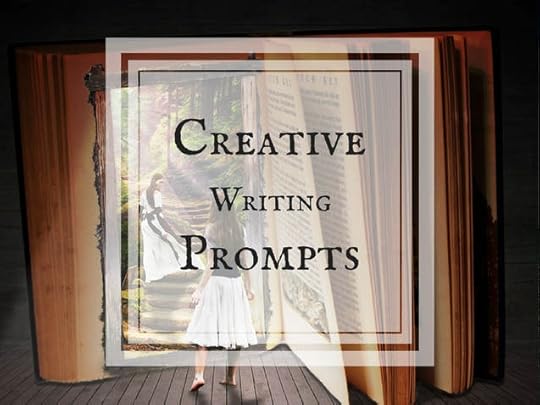 While deciding on the topic for my next blog post, I realized that it had been quite a while since I did one for writing prompts. We writers are always looking for ideas, so I thought I'd add a fifth installation to the ongoing series. After all, there's nothing like a good writing prompt to spark the imagination!
While deciding on the topic for my next blog post, I realized that it had been quite a while since I did one for writing prompts. We writers are always looking for ideas, so I thought I'd add a fifth installation to the ongoing series. After all, there's nothing like a good writing prompt to spark the imagination!The following prompts are a little wacky, a little weird, and a few even turn cliches on their heads. They also cross several potential genres. Enjoy!
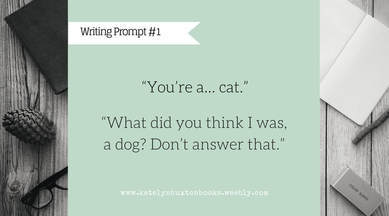 Writing Prompt #2
Writing Prompt #2“I am small but mighty.”
“Yeah okay, mmm-hmm. I’d be more inclined to believe that if you hadn’t just run from the toaster.”
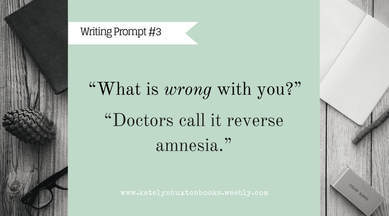 Writing Prompt #4
Writing Prompt #4“Wings are more trouble than they’re worth, let me tell you.”
“But you can get places so much faster!”
“Bumping into someone on the sidewalk in no way prepares you for mid-flight collisions. Let's walk.”
 Writing Prompt #6
Writing Prompt #6“When she said she could probably burn water, I didn’t realize I was supposed to take it literally.”
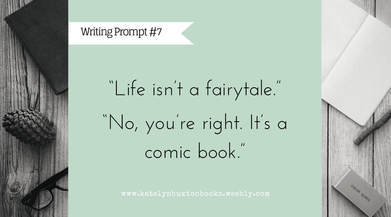 Writing Prompt #8
Writing Prompt #8“I hate to be rude, but you really are the personification of a headache.”
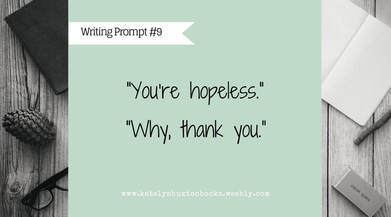 Writing Prompt #10
Writing Prompt #10“Back in my day, children, we had the sun.”
------------------------------
Want more?
• Creative Writing Prompts I
• Creative Writing Prompts II
• Creative Writing Prompts III
• Creative Writing Prompts IV
• My Writing Prompts Board on Pinterest
Published on March 16, 2018 00:00
March 1, 2018
February Book Reviews
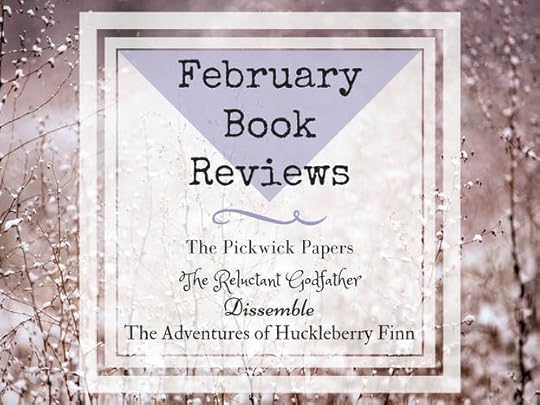 February was another awesome reading month! I finished The Pickwick Papers by Charles Dickens, as well as The Reluctant Godfather by Allison Tebo, Dissemble by Sarah Addison-Fox, and read The Adventures of Huckleberry Finn by Mark Twain for #AuthorBookClub on Twitter. As usual, it was a pleasant mix of the old with the new. If you haven't checked out any of these authors yet, do! Twain and Dickens have stood the test of time for their wit, while Allison and Sarah are bringing new life to the independent writing scene.
February was another awesome reading month! I finished The Pickwick Papers by Charles Dickens, as well as The Reluctant Godfather by Allison Tebo, Dissemble by Sarah Addison-Fox, and read The Adventures of Huckleberry Finn by Mark Twain for #AuthorBookClub on Twitter. As usual, it was a pleasant mix of the old with the new. If you haven't checked out any of these authors yet, do! Twain and Dickens have stood the test of time for their wit, while Allison and Sarah are bringing new life to the independent writing scene.The Pickwick Papers
Charles Dickens
My rating: ★★★
[Minor spoilers ahead.]
In all honesty, this is a hard book both to rate, and to review! It had some truly wonderful moments, but it also had a lot of slow and “meh” moments too. (Although even the “meh” was carried off with characteristic Dickens wit, which made even that not seem too terrible.)
Being that this is my first experience with the work of a much younger Dickens, I was impressed with how closely it resembled his later writings, albeit with more humor and more rambling with less point. The beginning of The Pickwick Papers sort of reminded me of A Tale of Two Cities, since it was a bunch of seemingly random scenes thrown together, but unlike A Tale of Two Cities, most of them remained just that… random. (Although it’s important to take into consideration the fact that this was serialized in a newspaper, and therefore reading it all at once is an entirely different experience than that had by the original readers.)
The latter half of the book was better thought-out, however, and was altogether more satisfying, and there was even a point at about the three-quarters mark that I thought I’d have to rate it four stars instead of three if it kept up its wonderfulness to the end. Unfortunately, it didn’t. [Here come the minor spoilers!] The part I’m speaking of was when Mr. Pickwick found himself landed in a Debtor’s Prison. Charles Dickens knew something about this subject, since his father was arrested and sent to one when he was 12, and it shows in the heart put into those chapters. They were the most serious in the entire book, and beautiful in a horrible and sad kind of way.
And Sam. Can we just talk about Sam Weller for a minute? He was Mr. Pickwick’s servant for most of the book, but I have officially come to the conclusion that all the best sidekicks are named Sam. He was a young man, but had a good head of rock-solid common sense, and a funny mode of speech that he inherited from his father, full of halfway macabre anecdotes and hilarious sayings. I can’t say that Mr. Pickwick, like Frodo, wouldn’t have got far without Sam, but he was close. Sam’s most shining moment was when he followed Mr. Pickwick to prison and indebted himself so that Mr. Pickwick couldn’t tell him to leave. They were both there by choice, and though Mr. Pickwick was an older man, Sam still had his whole life ahead of him—yet he chose to stay with “the governor.”
The reason I gave it three stars, however, is that it may have been awesome in serialized segments, but all at once it seems a bit fragmented and rambles a lot. Now, obviously, I don’t mind a little rambling, since I usually love Dickens, but rambling without a purpose is annoying. I also have my doubts as to whether anyone knew what the meaning of a non-alcoholic drink was (except for the ladies, who drank tea only to "lay the foundation" for spirits, as Mr. Weller senior put it), since there was a ridiculous amount of drinking in this book, a lot of d--ning, as well as kissing without being married or even engaged, several mentions of unfaithfulness, and a couple awkward scrapes with a man and a woman (one of which lands Mr. Pickwick in the Debtor’s Prison, because he loses in the court and refuses to pay up because he knows he’s innocent.)
On the other hand, however, I will now know what the March girls were thinking of when they decided to make up their own Pickwick Club in Little Women. (I love it when classics recommend other classics, don’t you?) :P It’s a book that leaves you feeling as if you’ve traveled a long way with Mr. Pickwick and Co., and drops you gently off with a satisfying but practical happily-ever-after sort of ending.
~~~~~~~~~~~~~~~~~~~~~~~~~~~~~~~~~ The Reluctant Godfather
Allison Tebo
My rating: ★★★★★
Well, that was glorious! I’m left wondering why I didn’t read The Reluctant Godfather sooner. It’s a quick read, but surprisingly weighty for its briefness, yet hilariously light-hearted at the same time. (And witty—so witty! Burndee’s mental process had me laughing out loud several times.)
Speaking of which, Burndee, the main character, is a gift to mankind. No, really. He’s grumpily kind-hearted, and those characters are often the absolute best, because they’re relatable. Very few of us are naturally upbeat like Ella—and watching Burndee go from a very reluctant godfather that wonders why anyone would ever want him, to genuinely caring about his wards and desiring their welfare even when he makes mistakes in the process—well, it was beautiful. Also, he bakes. A baker myself, this scored instant points. :P
And the romance! The Reluctant Godfather contains the sweetest little love story you ever did see. It didn’t wallop you across the head with over-the-top sentimentality (or worse), but it felt real and natural, and I was immensely satisfied by how it all turned out. (
This book is also squeaky clean, as far as I can recall, unless you count the underlying problem of Prince Colin being forced to marry (thus the familiar ball), in order to produce an heir. Other than that, there’s nothing in the way of objectionable content! My only criticism is that sometimes the dialogue tags were a tad awkward in my opinion. (Example: characters sometimes enthused their dialogue.) That’s kind of nitpicky though, and didn’t really get in the way of my enjoyment.
To use Burndee’s words: The Reluctant Godfather is... neat. Go read this neatness. You won’t regret it!!
~~~~~~~~~~~~~~~~~~~~~~~~~~~~~~~~~
Dissemble (Allegiance #2)
Sarah Addison-Fox
My rating: ★★★★
~ I received a free ARC in exchange for an honest review ~
Dissemble takes the world that we were introduced to in Disowned and builds upon it in a realistic and familiar way. We’re reintroduced to Celeste and Mick, as well as the rest of the Haynes family, plus a whole new cast of characters that add brand-new intrigue to the storyline.
Along the way Celeste is forced to confront her past, and her relationship with a certain *cough* corporal blossoms. Honestly, this was a book that I found hard to put down! There was always a new “loop” opening to keep me going. We also get in Mick’s head a little more with this one, (which I loved), and watch some serious character development happen. In the beginning he’ll do anything he can to keep the one he loves safe, but by the end he realizes that he can’t. He’s only human. The best he can do is face life by her side—together.
Maggie doesn’t perform as large a role as she did in Disowned, but she’s still the same lovable mother figure. Ditto with Ethan as a father figure, but Sadie and Joe get a little more “screen time,” especially Sadie. She’s just learning to step out and stand up for herself, and her good-intentioned attempts to befriend a lonely new girl were heart-warming (even when the girl rebuffed her efforts and hurt our precious Sadie’s feelings)! We also get to learn more about Sir Lewis, which was awesome. He was introduced as an important character in Disowned, so I liked getting to know him a little better in this one.
And the new characters! Amaya is a tail-kicking strong female character that still has feelings (#yasss), and Torrance is someone that went through several evolutions in my mind as his many layers were revealed. Plus, there’s a twist at the end concerning him that took me totally by surprise!
The reason I docked a star from Dissemble despite the fact that all the characters were life-like and unique, and the writing seemed even more streamlined and impactful than in Disowned, was because there was quite a bit of mature content involving sexual innuendo. Now, a most of it was pretty understandable from a plot standpoint, because Celeste came out of a really awful situation, and most of the book takes place in her homeland, but it was still a little rough to read. That, and a very light smattering of language and some drinking is the reason I gave it four stars.
But—that said, everything else about Dissemble expanded and improved upon the world introduced in Disowned, and I’m looking forward to the third installment in the Allegiance series, and seeing how Etra works in the characters’ lives next.
~~~~~~~~~~~~~~~~~~~~~~~~~~~~~~~~~
The Adventures of Huckleberry Finn
Mark Twain
My rating: ★★★★
The Adventures of Huckleberry Finn is a book that has been banned over and over again—but honestly?—some of my favorite books are banned ones. “Well, why do you like this one, you rebel?” you ask. Despite being steeped in the American south, where racism was a deeply ingrained part of society during the time that the book is set, it is ultimately a book that shows the humanity of the African-American people in an age when slavery had caused them to be deemed less than human.
Huckleberry Finn, (or simply “Huck” as he’s called for most of the book), is no knight in shining armor, and though he considers himself “low-down and ornery,” and thinks he “ain’t got no show” at doing right, he’s just about the most upright character in the book, without even realizing it. (With the exception of Jim… but I’ll get to that later.) Huck was raised on the Mississippi river, fending for himself most of the time, and dodging his father’s drunken abuse some of the time, and only getting a little help along the way from the Widow Douglas, who had adopted him at the end of The Adventures of Tom Sawyer, and tried to educate him for a while. He has a pretty convoluted view of God, since the Widow lived her faith, but Miss Watson (a relative of the Widow’s I think?) preached hellfire and damnation and turned Huck off to matters of faith.
That said, the moment when Huck decided that he would go to Hell if it meant that he could help Jim escape slavery is one of the most powerful in the book. It also goes to show just how brainwashed he was—but he was willing to rise up and go against the cultural norms that he’d been raised with, and help his enslaved brother find freedom—even if it meant going to Hell for it. (Which of course isn’t going to happen, but it just goes to show that he was willing to risk it all.)
And that brings us to Jim. Jim is just as much a product of his time as Huck is, and though he was stubbornly level-headed to the point of almost being foolish sometimes, he looked out for Huck like a father on their journey together down the Mississippi river. (And though I did say he was level-headed, he was also incredibly superstitious, as was Huck, and the fact that most of their superstitions were “proved” right throughout the book is one thing that annoyed me.) However, Jim was good-hearted and proved to be very, very human.
I would almost venture to say that Huck and Jim are two sides of the same coin. Though Huck was technically free, only by virtue of his particular shade of melanin, his life was little better than a slave’s when his father was around. And there was a point near the end where Huck commented that he always knew Jim was “white on the inside.” Which may seem like a dubious compliment, but he’d come to realize how small a difference there was between Jim and himself.
As for the rest of the book, it’s days spent hiding on islands around campfires, it’s nights spent on a raft in the middle of the Mississippi counting the stars, it’s so, so very country and American, and awakens my childhood, when I ran free in the woods and caught frogs and collected snakeskins just like Huck. (And no, I never had any bad luck come my way from the latter.) I also love Twain’s use of first-person with Huck as narrator, full of purposeful misspellings. This is one of the few books that I can say I wouldn’t have any other way. Usually I prefer third person, but first is the only way to go as far as I’m concerned for a book like this.
The reason I knocked off a star is the same reason as the first time I read it: the constant use of n----r (by slaves and free), and the fact that churchgoers are often painted to look foolish. The book is every bit a product of its time, and I don’t think the n-word had nearly the stigma attached then that it has now, but to a modern reader it is a bit jarring. That doesn’t make it right, but it’s part of history. History is full of horrible things, but pretending it didn’t happen isn’t the answer.
Aaand there you have it. My much-longer-winded review of a book that has stood the test of time despite its controversial topics. And there’s a reason for it. Controversy makes you think—and books that make you think—uncomfortable, even—are the important ones.
Published on March 01, 2018 00:00
February 14, 2018
Three Free Books in Three Days
 Happy Valentine's Day, everyone! This year I thought I'd jump in among all the romance novels going on sale and offer three non-romancy books for free by way of variety. (Because who doesn't love epic journeys to northern mountains to find freedom and hope any time of the year??)
Happy Valentine's Day, everyone! This year I thought I'd jump in among all the romance novels going on sale and offer three non-romancy books for free by way of variety. (Because who doesn't love epic journeys to northern mountains to find freedom and hope any time of the year??)Thus, I give you Branwen's Quest, Finding Hope, and Journey to Freedom (numbers 1, 4, and 8 in the Warriors of Aralan series, respectively). "Well that's great, I'll just skip all over the series," you grumble. Yes... yes, you will. And that's fine, because each of them is a sort of beginning in the series, and can be read without reading any of the previous ones. They'll only be free for three days though, (February 16th-18th), so have at it! (And when you do read them, be a good egg and leave a quick review on Amazon or Goodreads. They mean the world to indie authors like myself!)
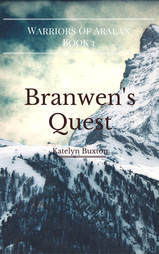 Branwen's Quest (Warriors of Aralan #1)
Branwen's Quest (Warriors of Aralan #1)When the royal herald came announcing a mandatory Tournament of Warriors, Branwen was the last one to get excited. Sure, she was a good enough archer, but why should she be forced to go to the tournament just because the king said so? She had nothing to prove! Yet when she got there her competitive spirit took over and she succeeded—enough so that she was singled out by the king to take a difficult journey with three others who were as different as night and day from each other. Why? To recover the king and queen's missing crowns. Will they ever be able to overcome their differences and get along to complete their mission, or will they fall prey to an unexpected danger posed from within?
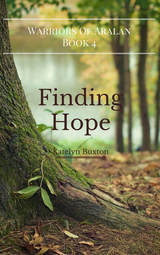 Finding Hope (Warriors of Aralan #4)
Finding Hope (Warriors of Aralan #4)Branwen’s fourteen-year-old daughter Rhoslyn, is intrigued when she comes home one day to find three strangers in the house, arguing with her parents. Who are these men? Two of them appear to be the same age as her father, but one of them is younger—much younger, about her age. He turns out to be Allister, Rhoslyn’s cousin, and he with his father and uncle have come all the way from Norwynnd. Needless to say, Rhoslyn and her best friend Bradyn get off to a bad start with Allister when they find him unusually secretive, and instead of deterring Rhoslyn with his bad attitude, Allister unwittingly encourages her curiosity. She knows he has a secret, and she’d determined to find out what it is. To complicate matters, a dark-skinned man from Calima, Aralan’s closest neighboring country, appears the day after Rhoslyn’s relatives, bringing with him a new religion, and it looks like he’s going to be there a while due to his broken leg. While he’s there he insists on telling others about his faith, and Rhoslyn doesn’t know what to think. Why is her cousin so secretive? Why does this man from Calima think she needs God? And most of all, why have her relatives from Norwynnd come to Linfort now, after all these years?
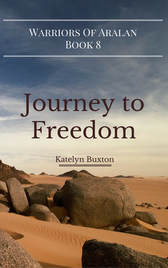 Journey to Freedom (Warriors of Aralan #8)
Journey to Freedom (Warriors of Aralan #8)Josiah is a prince... albeit one that has just about had it with his hypocritical parents and grandparents, the ruling family of Aralan. Sure, he's not that much different than they are, really—but when they turn down a small country's plea for help in an oncoming war, Josiah is furious. A full one-eighth of his blood comes from that country, and he can't believe his ears when they send the emissaries away without a promise of assistance. So he flees the castle, hires a cook to feed him in his travels, and breathes the free forest air for the first time in his twenty-one years of life. Sleeps on the ground for the first time in his life. And argues—constantly—with the most stubborn cook he's ever met in his life. Emma is not one to take orders quietly, despite coming from the poorest part of Freymont; a stark contrast with her sweet-tempered, eleven-year-old sister named Hadassah. Add in Josiah's crazy hermit uncle, a pair of mischievous identical twins, an unheard-of amount of sass, a war of epic proportions, and a betrayal or two—and you have a Journey to Freedom.
Published on February 14, 2018 00:00
February 1, 2018
January Book Reviews
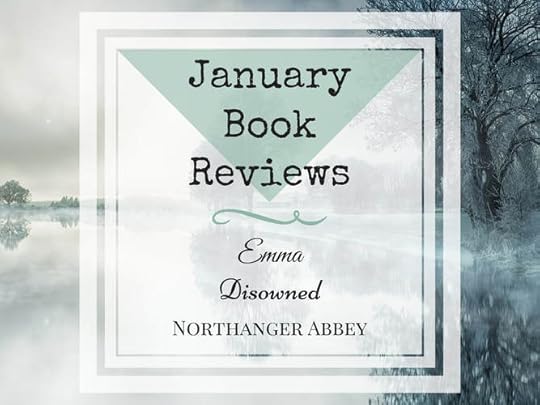 I tend to read a lot of classics, as well as new-and-awesome independent authors, and January has been no exception. Christmas brought some more Jane Austen into my life, which I couldn't resist, and Disowned by Sarah Addison-Fox had been on my radar for a while, so it's safe to say January's reading material was great. If you like books that are quieter and not so action-packed, these might be for you!
I tend to read a lot of classics, as well as new-and-awesome independent authors, and January has been no exception. Christmas brought some more Jane Austen into my life, which I couldn't resist, and Disowned by Sarah Addison-Fox had been on my radar for a while, so it's safe to say January's reading material was great. If you like books that are quieter and not so action-packed, these might be for you!Emma
Jane Austen
My rating: ★★★★
Emma is a very solid four-star read for me. Austen has a way of bringing you right into the world of her characters, and making you care about little, everyday happenings, as well as the bigger, not-so-everyday stuff… like getting married. (I mean ‘cause you know it’s going to happen, being Jane Austen and all.) :P
Previously, I’ve read two other Austen novels: Pride and Prejudice, and Sense and Sensibility. I find them to be a pleasant variation from the typical “save the world,” type things I usually read, and going back in time to the eighteen hundreds is another plus. (I kinda sorta love that time period, *cough*.) The problem with having read two Jane Austen books before, however, is the fact that by round three, they begin to become a little predictable—there always seems to be a Mr. Collins, Wickham, and Darcy, to use Pride and Prejudice terms. (I won’t say more than that for fear of spoilers, but I saw who the main character, Emma, would end up with almost from the very beginning.)
Speaking of Emma, at the start of the book she was quite the “nonsensical girl,” as Mr. Knightley once put it, almost to the point of being irritating. However, by the end she had grown a lot, as a character, and as a person. I thought that it was a refreshing arc, because Elizabeth from Pride and Prejudice already had a good head of sense on her shoulders, as did Elinor from Sense and Sensibility, but Emma was more relatable because she wasn’t perfect. (Also, she had declared that she would never marry—an extraordinary thing, given the time period and the fact that she’s in a Jane Austen novel. While I don’t think either extreme of the Marry-or-not-to-Marry spectrum is good—after all, we should be after what God wants in our lives—she wasn’t so bent on upholding that declaration that couldn’t be persuaded otherwise.)
As for the other characters--Mrs. E was infuriating, Mr. Knightley by far my favorite male character, Harriet quiet and sweet, Mr. Woodhouse funny and endearing despite his obsession with health, Mr. and Mrs. Weston just the sort of lovely people you want to associate with, and Miss Bates… holy cow, that woman could talk—just to name a few.
The reason I didn’t give it four stars despite the super-satisfying ending that gave you time to enjoy it before dropping you back into the real world again, was the fact that it did drag a little at times (although that might just be my attention span to blame there), and everyone lived Happily Ever After™. I know it’s Jane Austen, but I felt like the end of Harriet’s subplot was just a little thrown in, so you wouldn’t feel too bad about Emma’s turning out all right in spite of everything.
Those are my only complaints, however. Although Pride and Prejudice still reigns as my favorite Jane Austen novel to date, this one’s a close second, and is definitely worth the read!
~~~~~~~~~~~~~~~~~~~~~~~~~~~~~~~~~ Disowned (Allegiance #1)
Sarah Addison-Fox
My rating: ★★★★
Another reviewer mentioned that this book stands out for its quietness and homeyness, and if that isn’t a good description of Disowned, I don’t know what is. It’s not action-packed, full of heroes that never go wrong, no—it’s filled with real people living real lives with real problems. I was invested in Celeste’s life from the very beginning, since the story begins in medias res, and once she found herself in a home with people that didn’t see her as an object—and in fact wanted nothing more for her than her welfare—well, it was then that her healing began. Granted, it takes a while, but that makes it realistic.
As for the characters, Celeste is rough-around-the-edges, having spent almost her entire life in slavery, Mick is lovable and humorous despite being rough-around-the-edges in a different way, Maggie is the picture of strong, affectionate motherhood, Sadie and Joe are sweet, Ethan a big teddy bear (I mean really xD), and Asher... is Asher. *sidelong still-suspicious glance*
I also loved seeing a Christian homeschool family depicted in such a relatable way! It’s not something you see very often in fiction, and it brought back memories of my childhood. The Haynes’ faith in Etra (God) seemed natural, and wasn’t pushed on Celeste, but they made no effort to hide it, and when she asked to be taught from Etra’s book, Maggie was ready and willing. That said, there was a different religion in Kyraenea. Though it wasn’t described in detail, it was a nice addition! It’s another thing that made Celeste’s world so achingly familiar and realistic.
The “stuff” comes in the form of brief instances of smoking, drinking (including Someone getting very drunk), a very light smattering of swear words (two or three times total?), injuries being described in a fair amount of detail (which might bother some—I’m not squeamish), a couple instances where a male observer took extra notice of female beauty, and the fact that working the mines isn’t the only kind of slavery Celeste’s people engage in... there’s also one that involves a revealing red dress. That sort of thing is always difficult to think about, especially as a woman, but it was handled tactfully, and in the end, I had no objection to it being there.
My only non-“stuff” dislikes are mainly about the... vagueness?... of the physical appearance of the world. There was a lot of world building, but I found myself missing a mental image for the kinds of structures to be found in a typical Etraean village. They had electricity, so it seemed fairly modern, but Celeste observed early on that they were more advanced that Kyraenea, so I wasn’t sure whether the world took a more fantasy or sci-fi or modern-with-a-hint-of-fantasy leaning. I guess I’ll learn more about that in the next book, after the way this one ended, but it would have helped to have a little more detail there.
In the end, however, everything about Disowned is so down-to-earth, that what I just mentioned interfered very little with my enjoyment of it. The effect of war on a man, the highly-researched injuries, treatments and symptoms, the way it embraces every messy detail of life, including upchuck, water rings on the table, dishes, and the occasional bit of family tension... seriously, you guys. Read it! It’s refreshing in its quiet power.
~~~~~~~~~~~~~~~~~~~~~~~~~~~~~~~~~
Northanger Abbey
Jane Austen
My rating: ★★★★
This book is glorious, simply put. For a large chunk of it I had to wonder why it seems to be one of the lesser-known Jane Austen novels. The chosen heroine, Catherine Morland, grew up a tomboy, is bookish, rather naïve, and a hopeless romantic—her Love Interest is even more well-read than she is—and Austen fearlessly breaks the fourth wall on a regular basis. In short, I was thoroughly prepared to give it five stars and challenge Pride and Prejudice as the reigning champion of my favorite Jane Austen novel, except for the end, which just wasn’t satisfying.
But before I get into that, let me just talk about Catherine a little more. She was a tomboy until age fifteen, (when she settled down somewhat), loves to read, fangirls before it was a thing, views life through the colorful lens that reading gives it, is, admittedly, a little oblivious from time to time, always wants to think the best of people, and is infatuated old architecture. She’s like Anne Shirley meets Jane Bennet meets me. *awkward laughter* Also, she never fell for anyone but the Right One. (Can I get a hallelujah?? Amen.)
Northanger Abbey seems to be a little more condensed than most Jane Austen novels, as well, and therefore moves quicker without introducing a Collins or Wickham, (although there was one guy that was kind of a jerk, but could’ve been worse, I s’pose), and kept me interested throughout. The character that disgusted me the most in this book was not a scoundrel of a man at all, in fact—it was a certain scoundrel of a young lady who dared to call herself Catherine’s friend. *glares* A close second was Mr. Love Interest’s father, when he showed his true colors.
As for the rest of the book, it was glorious, like I mentioned. Catherine gets herself into a truly awkward scrape when snooping where she shouldn’t (think reader death-by-second-hand-embarrassment type situation), but experiences grace unlooked-for. This tames her wild imagination somewhat, and makes her a steadier person altogether.
The only reason I didn’t give it five whole stars, as mentioned above, is because of the ending. It was sudden (a reoccurring problem I’ve noticed with Jane Austen in general), and because of this, the moment when Catherine’s Mr. Right confesses his feelings is skimmed over and summarized in a few paragraphs. There wasn’t one line of dialogue. That eliminated the payoff, and left me feeling rather cheated, since the rest of it was so enjoyable. *whispers* Authors, don’t do that. There’s a time and place for summarizing conversations, but the moment of payoff isn’t it.
All things considered, however, Northanger Abbey was a fitting end to this collection of Jane Austen novels, and definitely worth a read, if you like reading about characters that like reading. (I know I do!)
Published on February 01, 2018 00:00
January 15, 2018
How to Write Killer Descriptions
Published on January 15, 2018 00:00
January 1, 2018
December Book Reviews
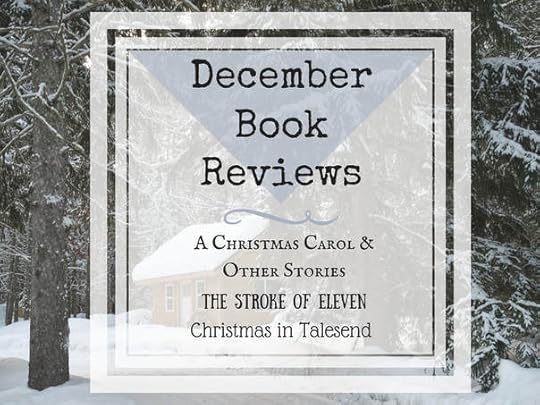 2017 was a big book year for me. I not only published three of them, but I rediscovered my love of reading (*gasp*, bad author), and learned to write those reviews I so desperately craved myself. Going into 2018, I want to continue writing reviews of books I read, and so I thought I'd start doing a once-monthly blog post in which I compile the previous month's reviews all in one place. (Because every bookworm loves finding new reads, right??)
2017 was a big book year for me. I not only published three of them, but I rediscovered my love of reading (*gasp*, bad author), and learned to write those reviews I so desperately craved myself. Going into 2018, I want to continue writing reviews of books I read, and so I thought I'd start doing a once-monthly blog post in which I compile the previous month's reviews all in one place. (Because every bookworm loves finding new reads, right??)Thus, I give you December's offering... in January. There's quite a bit of Christmas going on here (oddly enough), so if you need a little something to ward off the January blues, I have some recommendations. ;)
A Christmas Carol and Other Stories
Charles Dickens
My rating: ★★★★
A Christmas Carol
5 out of 5 stars
[I copied most of this from my original review of A Christmas Carol, which can be found here.]
This book is weird. This book is spooky. This book is deep. But it also captures so perfectly the essence of Christmas—that “goodwill towards mankind”—that makes the season so beautiful.
I have to say, though, that one of my favorite parts came early on when Marley’s ghost visited Scrooge:
‘You are fettered,’ said Scrooge, trembling. ‘Tell me why?’
‘I wear the chain I forged in life,’ replied the Ghost. ‘I made it link by link, and yard by yard; I girded it on of my own free will, and of my own free will I wore it. Is its pattern strange to you?’
Though I don’t believe in ghosts, and certainly don’t believe that anyone is cursed to “go forth” in death if they didn’t in life, it was a very vivid picture of the chains we all end up trapped in at some point—the chains that only God can free us from. Marley’s chains were made of cash boxes and other things related to the miserly business he and Scrooge conducted. It was a sobering reminder that we aren’t to get so caught up in our business that we forget to be a blessing in other peoples’ lives. And that’s something we all need to remember from time to time—both during the Christmas season, when it seems to come so naturally, and the rest of the year.
Also, I’d just like to say that Scrooge is one of the most well-thought-out characters that I’ve ever come across, especially in older fiction. In the beginning Dickens introduces him as the most tight-fisted, crotchety old miser there ever was, but then he colored in his past and made me pity him, since he hadn’t always been that way, and by the end, Scrooge has undergone a tremendous change in his arc, and his joy at having been given a second chance was palpable.
All in all, it’s a new favorite, and will probably become a yearly Christmas-time read for me. (In fact I read it twice this December, after reading it for the very first time—which says a lot, coming from a person that hardly ever re-reads books!)
The Chimes
3 out of 5 stars
Admittedly, it’s got to be tough to be the story that comes directly after A Christmas Carol, but I didn’t enjoy this one as much. It was a biting satire highlighting the way rich people brainwash themselves and the poor people under them with comfortable lies—comfortable lies about how they’re a Friend and Father to the poor when they really do nothing but Put them Down. That made it rather depressing, for a large part of the book, since the main character “dies” early on, and in ghostly form watches his beloved daughter travel a hard path on her own, and ultimately try to commit suicide, because she believes the lies. The darker feel of this one knocked off two stars, since I personally don’t enjoy that as much, but it was extremely effective in its satire, and the characters were vivid, and the plot as well thought out as ever, thus the three I left.
The Haunted Man
3 out of 5 stars
This one was a little darker as well, but not as much as The Chimes, I thought. It was kind of a rewriting of the Midas’ Touch idea... except instead of turning everything he touched to gold, the main character erased all the memories of sorrow and wrong that a person had. Which sounds good in theory, but those times of suffering help us to appreciate the good times all the more, and without them everyone turned miserable and ungrateful. It was really thought-provoking, thus the three stars, but it didn’t grab me as much as some stories, and it felt a little dark. (Not “bad” dark, just depressing dark.) :P
Altogether I rated A Christmas Carol and Other Stories four stars since A Christmas Carol had rocketed so high on my list of favorite books, but the other two weren’t as impressive. Worth a read, definitely, but hard acts to watch after the first, which was such a work of genius.
~~~~~~~~~~~~~~~~~~~~~~~~~~~~~~~~~ The Stroke of Eleven (Beaumont and Beasley #3)
Kyle Robert Shultz
My rating: ★★★★★
I honestly have no idea how Shultz does it, but he does. Every addition to the Beaumont and Beasley world gets better, and The Stroke of Eleven is no exception. This book was such a rollercoaster of feels, and such a whirlwind of well-thought-out plot, and familiar, vivid characters, that I am sitting here in awe.
Nick and Cordelia are still their lovable selves, as are the Mythfits and Malcolm (although don’t tell him I said that.) But Crispin. *screams into the void* *mutters unintelligibly* *bleeps our several spoilers*What have you done to my precious optimist, Shultz?? Read this book, you guys, because I may not be able to hold the spoilers in much longer. *tries to look a little less crazy than the Mad Hatter* *probably fails*
Speaking of which, this book is titled The Stroke of Eleven, and is definitely a retelling of Cinderella, but it also has some serious Alice’s Adventures in Wonderland and Through the Looking-Glass influences, which I absolutely loved, having read both of those books for the first time recently. (Impeccable timing, I must say—those whether it’s mine or Shultz’s, I don’t know.) :P
Another lovely element was the time-travel, which left my head spinning, but was a lot of fun. Each installment in the Beaumont and Beasley series deepens the world, and this one showed me just how vast the scope for the future of these books is. The time-travel just added to that.
The only “stuff” I have to note, since these books are really very clean, is a kiss, two or three uses of God’s name in vain, the usual magic, and for those who care, the fact that this book feels a little... “darker”... than the rest. I guess serious is a better word than “dark.” The dialogue was just as hilarious and witty as ever, but it felt a little more sober-minded at times. Personally, I appreciated this, since it’s supposed to wrap up the first trilogy in the Beaumont and Beasley series, and finales have to have weight, but that was a change I noticed.
And now I’m off to read Christmas in Talesend since I don’t have to worry about spoilers from that any more, and to eagerly await the next installment in the series.
~~~~~~~~~~~~~~~~~~~~~~~~~~~~~~~~~
Christmas in Talesend (Beaumont and Beasley Case Files #2)
Kyle Robert Shultz
My rating: ★★★★
[Possibly some minor spoilers.]
Christmas in Talesend is a lovely short story collection featuring all of our favorite Beaumont and Beasley characters around Christmas time. It packs a major Christmas punch, with Santa, Reindeer, and Elves, and is peppered throughout with the usual hilarious dialogue!
(Although I should mention that if you don’t want to spoil The Stroke of Eleven, I’d wait until after you’ve read that to read this.)
The Red Muffler
3 out of 5 stars
This one is about Gareth and Sylvia, two of our beloved Mythfits. The Narnia reference in this one was amazing, but except for the addition of frost giants, which was cool, it didn’t really grab me. This is probably just personal preference, however. It was a nice Christmas story, and Gareth really did mean well when took the little girl home in and out of the weather. xD
Dash Away
4 out of 5 stars
I enjoyed this one more, since it featured reindeer (mentioning a certain red-nosed one that was a big part of my childhood), and I got to learn a little more about “Alan son of Kevin.” (I find that phrase ridiculously funny, by the way. He’s a centaur for goodness’ sake!) xD He’s not rock-solid all the way through, something Bryn has evidently always known, but I didn’t, having just seen him from the outside previously. Also, I loved that Christmas elves are not the squat, jolly, round fellows they’re usually depicted as being. :P
The War on Christmas
5 out of 5 stars
This one I absolutely loved! Crispin and Molly... they’re right. Onlythey would get caught up in that kind of a war Christmas Eve. xD And the Rise of the Guardians references... ack. I was also left thinking just how “ominous” Carol of the Bells would sound coming out of an Undine’s mouth. Good grief. 0_o Another thing I appreciated, too, was that this one took the time to mention that Christmas isn’t all about Santa, and [a certain springtime holiday] isn’t all about [a certain long-eared mythological creature]—and that they’re both about Someone much greater.
Saint Nick
5 out of 5 stars
This one is exactly what it sounds like. Plus a Christmas Dragon. xD Nick, Cordelia, and Malcolm took the time to brighten up a traditionally horrific orphanage on Christmas Eve. It’s a heartwarming end to an already heartwarming series of short stories, and showed that Christmas isn’t about receiving—it’s about giving—giving of ourselves to make the lives of those less fortunate better.
Published on January 01, 2018 06:00
December 26, 2017
His Favorite Rakkaus Story
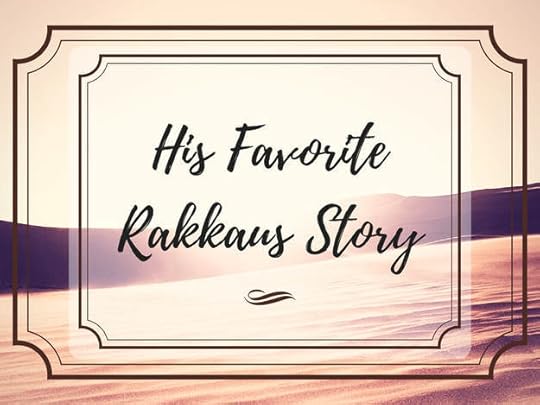 Merry (belated) Christmas, dear readers of this blog!! I wanted to celebrate by writing a Christmas short story tied into the Warriors of Aralan series. I've written very few short stories, much less any Christmas-y ones, so it was something refreshingly new. It takes place in Calima, which is a country of dark-skinned people on Aralan's western border, a people that figure prominently in Journey to Freedom (WoA #8). Ironically, this Warriors of Aralan short story contains only one passing reference to Aralan itself.
Merry (belated) Christmas, dear readers of this blog!! I wanted to celebrate by writing a Christmas short story tied into the Warriors of Aralan series. I've written very few short stories, much less any Christmas-y ones, so it was something refreshingly new. It takes place in Calima, which is a country of dark-skinned people on Aralan's western border, a people that figure prominently in Journey to Freedom (WoA #8). Ironically, this Warriors of Aralan short story contains only one passing reference to Aralan itself.I chose Calima as the setting for several reasons, but mainly because they're the country that introduced Christianity to Aralan back in Finding Hope (WoA #4), and would therefore be most likely to celebrate Christmas if any of the people in my stories did. I also chose them for the fact that the Caliman twins I introduced in Journey to Freedom are so full of the Christmas spirit the rest of the year, that they'd be the perfect ones to deliver this story during the actual Christmas season. (Only they don't call it Christmas—they call it Rakkaus—and if you're curious what that means, Google the translation.) ;)
This story takes place in the "winter" before Journey to Freedom, so if you've read that, there'll be lots of Easter eggs hidden inside. But if you haven't, don't worry, there aren't any spoilers. You'll just get to see a pair of awkwardly adorable identical twins doing their thing in my version of a Christmas story. :) Enjoy!
His Favorite Rakkaus Story
------------------------------------------
“You want to hear Elias’s favorite Rakkaus story?” Emory feigned a groan and glanced at his brother, enjoying the clamor of small voices just as much as he did.
All around them was a crowd of little ones, beaming faces highlighted by the cozy flickering glow of firelight emanating from the hearth. Nearby Emma, Josiah and Hadassah sat around the table on one end of the cottage, looking fondly upon the children—the oldest of which was barely ten years old.
This child in question lay on the floor on his stomach, chin propped up on both palms, grinning as he blew a stray lock of dark curly hair out of his face. “You always act like you don’t want to tell it, but you do!”
Emory heaved a long-suffering sigh and rolled his eyes. “If I must! But maybe I want to tell my favorite Rakkaus story once in a while you know…”
Elias prodded him in the ribs. “No one wants to hear about the five pounds of lamb roast you ate in one sitting any more than you want to remember the stomach ache it gave you.”
Emory looked indignant. “How should you know? Maybe I do!” After pausing dramatically for an instant, he leaned out over his young audience and lowered his voice to a ghostly whisper: “‘Twas a dark and stormy night—”
“It was not!” Elias treated his brother to another good jab in the ribs, much to the hilarity of the children present. “If you’re going to tell a story, do it right.”
Emory rubbed his ribs ruefully and appealed to the imagination of the youngsters. “Every good story deserves embellishment, doesn’t it? After all, announcing that it started on a bright and sunny morning doesn’t grab your attention much!”
“But it did start on a bright and sunny morning!” Elias laughed, “And it wasn’t just any bright and sunny morning. It was Rakkaus. And that was a very promising fact to the young whipper-snappers that we were…”
~R~ The moment the sun rose over the far eastern horizon and tinged the arid Caliman sky pale blue, Emory and Elias were out the door of their cottage and surveying the small town of Orston with great satisfaction. Every mud-brick house was decked out with what little greenery the desert could provide, which mostly took the form of palm fronds hanging from the eaves and cacti gracing the windows. One of these fronds dangling from the eaves of their own cottage tickled Elias’s ear in a faint breeze, and he brushed it away.
The air was pleasantly chilly, having not yet recovered from the night’s absence of the sun, and Elias breathed deeply, savoring the temporary coolness. As always, he felt his heart swelling alongside the breaking of the day on this most glorious of mornings—Rakkaus—the day the Calimans celebrated the birth of their Savior. It was his favorite day of the year, and he intended to make the most of it, in the way that only an eighteen-year-old Caliman could. There would be races, and dancing, and gift-giving and singing and church, and he didn’t want to miss a single beautiful moment.
Soon the hungry bleating of their sheep drew the brothers away from their silent stand of satisfaction, and they wandered around back to feed their flock, where they were temporarily penned for the day. Even the dusty aroma of the straw they forked into the pen didn’t make Elias sneeze on this wonderful morning. He felt sure that nothing but good things would happen. Nothing but good things could happen.
Not long after the sheep were fed, their mother’s welcome voice sounded, calling them to breakfast, and the haste they made to beat each other back to the door was one that a bystander would have thought the races had already begun. Emory beat Elias by a hair—such a slim hair, in fact, that they got jammed in the doorway—and burst inside with a gasp of laughter.
Neither of their parents viewed this as at all unusual, however—raising such a set of twins had made them immune to most surprises by this time—and they were quickly ushered to the heavily-laden table by their mother. The family joined hands as father said grace, and then immediately fell to savoring the dried dates for their porridge, the buttered toast, and the fresh milk. Everything tasted better on this lovely morning, and soon the food had disappeared entirely under the brothers’ ravenous appetite.
Both Emory and Elias were looking forward to the races immensely, and since it was the event that kicked off Rakkaus for Orston, they wasted no time in heading for the door after breakfast. But their mother stopped them before they could put a hand on the latch.
“Oh, boys,” she called, “Wait one moment. Since you’re going that way, take this basket of Rakkaus sweets to Talya’s mother, would you?”
Anyone watching would have noticed Elias turn a peculiar shade at the mention of Talya’s name, but he took the basket as nonchalantly as possible and wasted no time in escaping to the freedom of the outdoors. He took a deep breath to clear his head, and even managed a grin as Emory caught up to him.
“She knows,” Emory whispered with a devilish smirk.
Emory was very nearly clobbered by the basket of Rakkaus sweets, but Elias caught himself just in time. Instead, he lifted his chin airily. “About what, might I ask?”
“Who you’re hoping to dance with this evening,” Emory replied, and narrowly ducked a non-basket swipe aimed at his head. Instead of repenting, this retaliation seemed to delight him. “Ah! I was right!” he crowed, and was immediately forced to flee as his brother pelted after him.
Elias was not really angry with his brother—very few things ever came between them—but he thought that he’d rather die than have anyone else know what he thought of the pretty young Caliman girl that had recently come to live in Orston. The fact that Emory was mentioning it so freely was an alarming one indeed, and his alarm, and by reflection Emory’s, carried them halfway across Orston before they were stopped by a good-natured villager.
“Aren’t you boys running in the races?” the elderly man asked.
“If Elias will ever stop chasing me,” Emory gasped, panting to catch his breath with a mischievous glance in his brother’s direction.
“Well then you’d better hurry—it’s about to start!”
“It’s what?” Elias exclaimed, looking worriedly at the basket he carried. He couldn’t run a race with that in his hand!
Emory seemed to share his thoughts, because he stopped grinning and looked around at their possibilities. Mud-brick huts with thatched roofs greeted them from every angle. “Set it on that table over there,” he said at last, and pointed to a long wooden construction that seemed to have been set up in the town square for their personal convenience.
“But that’s the gift exchange table! What if someone thinks it’s a present and takes it?”
“The gift exchange isn’t until noon. We’ll be done long before that, and can grab it before it starts. We’re speedy.”
“Mother’ll tan our hides and feed us to the sheep if anything happens to it—”
“But it won’t. C’mon!”
Emory’s reasoning was too much to resist. Elias dilly-dallied for a moment, then followed his brother over to the table and set the basket down. He noticed then that a few of the doughy confections had been jiggled loose from their resting places by his antics, and that the cloth cover was askew, so he clumsily repaired the damage and trotted after Emory as he headed for the races.
The races were a yearly installment in Orston’s Rakkaus celebration, and much-beloved by the young men of the town. Few girls entered, not because it was frowned upon, but because it usually ended up such a jostling, dusty, sweaty sport that not many cared to.
The event was held in a dried-up streambed that arced away from the town and out into the desert wilderness to the west, which made it easy for the spectators to see as they watched it from the banks. It also made it impossible for the runners to lose their way on the course, and end up running blindly out into the desert, which had happened before they utilized the streambed.
Emory and Elias arrived not a moment too soon, as everyone else that wished to compete was already at the starting line scratched in the dust at the bottom of the streambed. Elias was too busy returning the wave of their friend Tobias, who was competing, and scrambling down the slippery, dusty, pebbly bank, to pay much attention to the spectators, but when he was at the bottom and positioned between Emory and Tobias, he chanced to look up and spied Talya’s mother in the nearest group of spectators. And she was standing next to his mother.
Elias suddenly discovered a desperate need within himself to nudge a pebble by the starting line with his toe. At the same time, he wasn’t sure whether his feet would obey him when the starting signal came, or he’d run faster than he ever had before in order to flee. Running in front of spectators he didn’t mind—in fact he really rather enjoyed it, since it gave him a chance to distinguish himself from his brother—but guilt, among other things, rose up and confused him in that moment.
He was so distracted, wondering whether his mother had mentioned the basket to Talya’s and found it lost en route, that he missed the starting signal and was left choking on a cloud of dust. But he wasted no time in following, and immediately fell into the ground-eating lope of the famed Caliman runners, leaping rocks, dodging slick pebbly spots, and altogether catching up quickly.
As it turned out, chasing his brother had been a very good warm-up.
Elias felt his worries melting away as he sprinted after the last runner, drawing steadily nearer. He savored the pounding of his heart, the feeling of the wind rushing by, and exulted in the power he felt while running. He quit wondering about the basket and gave himself over to the enjoyment of the holiday. So what if he didn’t win? It was Rakkaus, and it was a glorious time to be alive. It was the one day all year when all of Calima put aside everything in order to love one another, and follow the example of the One whose birth they were celebrating.
He’d passed the last runner before he realized it, and then another. There were eight of them all told, and Elias forced himself to regulate his breathing, and conserve his energy for a final dash at the end. But even with these restrictions he flew on, and passed the third runner from the end, who glanced at him with surprise as he passed.
Elias had no idea how far he’d already gone—but at least he wouldn’t be the last one across the line. He set his sights on the next runner, and realized it was Tobias. That knowledge sent the new strength of friendly rivalry into his legs, and he kept on, almost laughing at the look of consternation his friend aimed at him as he passed.
“Oh come on!” Tobias yelled, “That’s not right! You started last and still passed me!”
Elias laughed, but after that had no more breath in him to reply than to laugh any more. The pounding of his heart was reaching fever pitch, and he concentrated on putting one sure-footed rapid stride after the other.
The next competitor was a girl, but Elias scarcely registered this fact. He was zeroed in on passing the next runner; nothing more, nothing less. It took him longer to pass her than he had anyone else thus far, for the very simple reason that she was gaining on the second place runner, and he had to run twice as fast to catch up.
But catch up he did, and neither of them spared a glance for the other as he inched by. They were both so dead set on the task at hand, that they didn’t want to waste precious moments seeing who had shown the other up.
Elias now had his sights set on his brother. Emory was running in second place, but only just—Elias knew he was biding his time, waiting until the end when he’d put on an extra burst of speed and win in dramatic fashion. He’d done it before.
But not today, brother. Elias’s breath was tearing in his throat by this time, and the roar of the blood pounding in his ears was deafening, drowning out the screams of the spectators watching from the bank. Brotherly competition gave fresh fortitude to his pounding legs, which were beginning to feel a lot like wet ropes.
He drew nearer steadily, steadily—and suddenly, Elias spied the finish line in the distance. It was time for the final dash. Emory, however, appeared to think he had plenty of time left, because he continued at the same pace, but Elias was catching up.
Elias’s feet churned the cracked mud streambed into a cloud of dust, pushing himself ever harder, ever faster. He was almost abreast of Emory.
The finish line was a hundred feet away, seventy-five, fifty—Emory finally put on the extra burst of speed that Elias had knew he would, and passed the lead runner—but Elias was in his element, and passed the former leader moments later. Twenty-five feet, fifteen—Elias could have reached out and touched Emory—ten, nine, eight, seven, six, five, four, three, two, one—and it was over. Elias burst across the finish line half a second ahead of Emory, much to the consternation of the judge, who sat nearby, and now had the troubling task of figuring out which twin had done the winning that day.
“What?” Emory’s exclamation sounded like the croak of a dying toad as they slowed down together. “How—?”
Elias laughed, gulping in great gasps of air, unable to reply for the moment. It was only when he had walked in several slow circles that he could draw breath enough to speak. “Today I won,” he said simply, and slapped his brother on the back. “Don’t worry, maybe it’ll be your turn next year.”
The look on Emory’s face was enough that Elias laughed again, then doubled over with a fit of coughing, every muscle in his legs trembling with exhaustion. He had given it everything he had, and though now he was so weak he could barely stand, it was worth it.
Just then the judge walked over, holding the prize—a wooden cup—and looked at the brothers uncertainly. “My congratulations!” he said, proffering the trophy to the safe zone between the two brothers.
Emory grinned and took the cup. “Why thank you! It was an honor to run today.”
As soon as the judge’s back was turned, Elias poked Emory in the ribs. “Excuse me!” he exclaimed. “That’s mine!”
“‘Course it is,” Emory laughed, and handed it over, slipping around to Elias’s other side. “I just had to make sure they weren’t cheating you, is all. Got to look out for my little brother. Y’know, one year they covered straw with mud and painted it to look like wood, instead of actually carving the cup out of the real thing.”
Elias rolled his eyes, taking his brother’s teasing with his characteristic good nature. “Oh, right, that’s it. Mhmm-hmm. Y’know, that story sounds an awful lot like the one father said his mother told him back when he used to compete—”
Emory grinned. “Minor details brother, minor details.”
By this time they had wandered out of the streambed and into the pressing crush of the crowd that wanted to congratulate the winner, but they waded steadily through, until they saw their mother. And then Elias stopped, and immediately began to backtrack. “This way, brother!” he exclaimed, grabbing Emory’s hand and towing him away. “It’s time to make a basket delivery!”
They successfully avoided Death by Sheep, and lost their mother in the crowd, walking quickly until they made it back to the gift exchange table. And what to their wondering eyes did appear, but the basket on the ground, divided by children so dear.
“Hey!” Emory shouted, “What do you think you’re doing?”
The boys—who evidently thought the basket fair game—looked up with surprise. They were all around ten years old or so, and much delighted by their Rakkaus plunder. “It’s a gift, isn’t it?” the leader of the little gang asked, looking at them with puzzlement.
“No—well, it is—but not for you!” Elias looked around anxiously for his mother—or worse, Talya’s. “Give it here. You haven’t eaten any of it yet, have you?”
The boys exchanged guilty glances. “What’ll you give us if we give you what’s left?” the lead boy asked slyly, instead of answering.
Emory and Elias exchanged mutual groaning glances, but then Elias was struck by a sudden idea. “Would this race trophy be enough?” he asked, holding it out.
Immediately the boys crowded around, admiring the wooden cup, and Elias saw their leader’s eyes shining with greed. “It’s a deal!” the little boy announced, and they immediately put what was left of the confections back in the basket, and made off with the trophy like the little bandits they were.
Elias looked sorrowfully at the now half-empty basket, and wondered where the cloth covering it had gone. “We’re dead,” he moaned, turning to Emory.
“Dead, cold, and ready to put in the ground.”
“We can’t give it to her like this!”
“No, but… maybe some flowers would distract her from the empty places? Maybe she’d think they were supposed to be there.”
Elias watched a little more hopefully as Emory wandered out of sight behind a nearby cottage and returned with a fistful of some half-dead greenery, which he proceeded to lay in a vacant spot amidst the sweets.
Elias snatched it back up again immediately. “Those are weeds, Emory, for goodness’ sake! Here, let me do it.”
He shoved the basket into his brother’s arms and sallied forth to find something other than the blooming grasses that Emory called flowers. It took some snooping, but he at last found some actual flowers of the wild variety, and when he returned, Emory was gone.
“What kind of Rakkaus is this?” Elias muttered, standing where he’d left his brother and looking around in vain. It was supposed to be a happy day, but was instead turning into the most stressful specimen of this holiday that Elias had ever experienced. Then he noticed both his mother and Talya’s engaged in conversation near the gift exchange table, along with a growing crowd, and knew why Emory was nowhere to be seen.
To his further horror, his mother noticed him at the same moment, and looked slowly from the flowers in his hand to his face with an unreadable expression. Elias wanted to melt into the desert ground, never to be seen again, but as that wasn’t an option, he turned and fled behind the nearest cottage, where he almost bumped into his brother.
Emory looked relieved as soon as he showed up, proffering the basket. “Put them here, and then, as soon as the gift exchange is over and Talya’s mother is away from ours, we can give this to her and be done with it.”
Elias put the flowers in the basket with a very deep sigh, and said nothing. The sooner this was over, the better.
Unfortunately, the gift exchange lasted quite a while—as it always did. Every so often Emory peeped around the cottage to check its progress, since Elias absolutely refused, and gave a report. It was always the same: lots of people, little change, and a lot of presents. But finally, nearly an hour and a half later—or fifteen years off Elias’s life—the group began to break up and drift towards the church to have their Rakkaus service.
This took a while, for the older women especially, since they were deep in conversation and apparently couldn’t walk and do that at the same time, so another half hour passed before their mother headed towards the church. But to their utter exasperation, Talya’s mother followed.
Emory and Elias exchanged pained glances behind the safety of the cottage. They’d have to wait until after the church service to get Talya’s mother alone. There was nothing for it but to stash the basket in the middle of a cactus patch and follow the crowds. So that’s what they did.
And Elias prayed that no scorpions would find their way into the Rakkaus sweets. Stranger things had happened.
The church was a very old building, built out of the purest sun-baked bricks Elias’s ancestors could get hold of, rectangular in shape, and complete with arched stained-glass windows and a bell tower, the inhabitant of which was at this moment busy in calling all of Orston’s people together.
Elias usually loved the unity of gathering at the church with fellow believers, on Rakkaus especially, but today he was much too preoccupied with the problem of the basket to really pay any attention—except for the fact that he made sure he and Emory did not sit by their parents today. That would only lead to an awkward whispered interrogation, and he wanted a chance to actually deliver the basket before he faced that kind of pressure.
He and Emory seated themselves towards the back, in one of the many polished dark wood pews placed perpendicular to the stand where their pastor stood to deliver sermons, and stared forward as if his life depended on it. He dared not glance to the right or left, lest he accidentally meet the eye of one of the two matrons he absolutely, positively did not want to meet at the moment.
Though they were some of the later arrivals to the church service, it took at least another quarter of an hour before people stopped filing through the door. All this time the pastor—an old, white-haired man with a quiet voice and a big heart—was moving amongst the people, wishing them a merry Rakkaus and generally spreading good cheer.
Elias watched his progress out of the corner of one eye, wishing for the moment when he’d head to the stand and begin the service, but it took a life age before he even looked that way. But at last he walked to the front, and at last he stood before the pulpit, gazing out over his congregation with a smile. “Merry Rakkaus,” he said finally, and glanced at the ancient behemoth of a Bible on the stand before him. “It is the day we celebrate our Savior’s birth.”
Instantly the hubbub of voices ceased, as every eye turned respectfully towards the front to hear the Rakkaus story read. Elias thought it was finally safe to look around, then, and studied the peaceful faces highlighted in the rainbow hues falling from the stained-glass windows lining the walls.
Suddenly, his own woes seemed small by comparison. And so he listened in thoughtful silence to the reading of Jesus’s birth, and especially to the bit that involved shepherds. This was the part that always rang truest with Elias, since he was one himself. He’d spent days without count trying to find a patch of green for his sheep to munch, and to think of thousands of angels suddenly appearing in the midst of all that lonely quiet and singing “glory to God”—well, it was a staggering thought.
He left the church calmer than he’d been entering it, and neither he, nor his brother spoke. It was early afternoon now, and most people were heading home for a time to eat the largest meal of the holiday with their families. This gave Elias an idea. If they could just deliver the basket to Talya’s mother while she was at home, things would be much easier. The only problem was that Talya was liable to be there also, an idea that made Elias’s stomach do a spectacular flip.
He shot a surreptitious glance at Emory, weighing the chances that he’d say yes if he proposed sending him to do the delivering alone. After a moment of calculating, Elias dropped his gaze to his feet and gave a little inward sigh. The odds were next to zero, or he wasn’t Emory’s twin.
Instead, they headed towards the basket as if drawn there of one accord, and to their utter relief it was in one piece, and looked as if it hadn’t been touched since they left it there. Elias even counted the pastries to make sure, and they added up to the right number. He grabbed the basket and exchanged a nod with Emory. “Let’s try going to her house.”
Emory merely nodded, and together they set out. It didn’t take them long, and soon they stood in front of a small hut on the edge of Orston. When they knocked, a pretty girl of seventeen answered the door, and Elias’s mind was shocked as blank as the desert sky. This was definitely not the plump, middle-aged woman they had been hoping for. She looked both of them over inquiringly, then at the basket, and then met his gaze. “Yes?” she asked, smiling softly.
Elias couldn’t speak—couldn’t even form a coherent thought—and instead held the basket out with a dumb kind of automation. He’d never felt as awkward his entire life as he did then. It was supposed to Talya’s mother, not Talya that answered the door! His mind was a buzzing hive of exclamation points, most of which were very confused ones.
Thankfully, Emory rescued him. “Merry Rakkaus,” he said, with a bow
Talya’s smile widened, and her eyes shone. “Thank you!” she said, taking the basket from Elias and looking from one to the other, as if unsure which of them she should be thanking. “My mother and have moved many times, but no town has been kinder to us than Orston. I wish we could stay here permanently, but we just got word today of some family in another town that wish for us to come live with them.” She glanced at the basket, seemingly heedless of its disheveled appearance, then looked up again and smiled at them both. “Merry Rakkaus to you as well, and many thanks!”
Then she shut the door.
Emory waved a hand in front of Elias’s face in the silence that followed. “Good grief, you look like you’ve seen a ghost.”
Elias stared at Emory. His initial reaction was an inward groaning of, “She’s moving?” followed by a pang of fierce disappointment, but then he pulled himself together and straightened, both outwardly and inwardly. “Let’s head home,” he said. Emory gave him another strange look, but mercifully didn’t prod. Elias didn’t know whether he was numb, or something else much like it, but a very small part of him was relieved. After the agony of the day, it was almost good to know she was going to pass out of his life soon.
Orston was like a ghost town as they wandered through the streets, heading back home, and not one face peeped out of a window at them as they passed, yet sounds of merriment could be heard outside of every hut. It was the time of the day that Orston’s community celebrated family, and took the time to reflect on the goodness of their Lord, and His mercy in sending His only son in the form of a tiny baby that first Rakkaus so many years ago.
Elias, however, was doing a very different kind of reflecting as he walked, and it was one that ultimately led to a much clearer head by the time they arrived at their door. Still, he said not a word, and only grinned as their mother greeted them with a cheerful scolding upon their arrival.
“My word!” she exclaimed, plopping a steaming bowl of lamb gravy on the table next to the roast lamb itself, “What have you been doing? We thought we were going to have to go out looking for you if you didn’t show up soon!”
Emory laughed as he pulled out a chair. “Mother, we’re eighteen.”
“But you’ll always be my boys,” she laughed, putting a ladle in the gravy and setting down a dish of roast vegetables in front of her husband, who was already seated and ready to begin. “Although,” she paused thoughtfully, “I would appreciate it if you acted like a mature young man and didn’t eat five pounds of lamb again this year.”
Elias and their father burst out laughing, but Emory had the grace to look mildly ashamed. “If you insist.”
Though happy, contented conversation and good-natured ribbing was going on all around Elias, he was uncharacteristically quiet as he ate. He decided that he was glad, deep down, that Talya was moving. He viewed it as an act of God. Perhaps what he felt could develop into something deeper, but Elias wasn’t going to waste time indulging that shallow feeling when there was no chance of that. This—he looked around at his mother, father and brother, engaged in animated conversation—this was love.
By the time everyone emerged from their houses, the sun was setting and tinting the pale blue sky with gold. It was the time for the dances. That morning Elias had looked at this event with a mixture of hope and fear, but now he viewed them as calmly as was possible for someone of his age. Emory, incorrigibly optimistic as ever, was raring to go. Usually Elias was right there with him, but not this year.
Unlike the dances of their neighboring country of Aralan, most of the dances the Calimans took part in were a community event. There were a few kinds that involved couples, but the fast, joyful, colorful, whirling celebration of life that began the end of Rakkaus was far from it. Slowing down didn’t come until later, when everyone was too tired to do anything else, if they were to continue at all.
Elias and his family joined the crowd drifting towards the western edge of the town, where colored lanterns had been set up on wooden poles, although it wasn’t dark enough yet to really see the difference they made. Everyone was decked out in their most colorful finery for this last event, creating a living blaze of reds and yellows, oranges, greens and blues, made of a light, airy fabric suited to the hot climate.
Already most of the young people were gravitating towards the open space in the middle of all the lantern stands, but a few of the more adventurous—or spry—mothers and fathers joined them, with the women lining up opposite the men, and not a few of these former exchanged whispered giggles.
Elias wasn’t so sure he really wanted to dance this evening, instead finding himself well content to watch this time, but he didn’t resist when Emory grabbed his wrist and began towing him towards the dance “floor.” After all, they did nearly everything together.
Emory finally let go when they were firmly stationed at the end of the men’s line, and turned to him with a lopsided grin. “Got to get the wiggles out before bed, right? That’s what mother always used to say.”
Despite himself, Elias laughed. “Because there’d be no rest for anyone if she didn’t make us run about ten laps around the cottage every night before we went to sleep.”
“And now let’s do about ten dances.”
“Ten!” Elias gasped, then poked him in the ribs. “Well I don’t know what you were doing lollygagging back there during the race, but this winner’s already a little tired, and needs his beauty sleep tonight.”
“Beauty sleep, hah!” Emory scoffed, and returned the good-natured prodding. “It’d take an awful lot of that to fix you.”
Elias made a show of drawing himself up stiffly. “Excuse me, sir, you share my face.”
Emory’s eyes wrinkled up, and for a moment he looked as if he were a fair candidate for Death by Laughter, but then the musicians began with their bean-filled gourds and gangling string instruments, and they were swept up into the whirlwind of Rakkaus joy. The dancers leaped back and forth, a skipping, whirling, twirling, organized chaos of color and laughter and light. That was the dance that the Calimans used to celebrate the birth of their Savior, and it was nothing short of a physical embodiment of the joy He brings. It looked like utter insanity from the fringes, but to those wrapped up in the middle, it was a breathless coordination of timing and rhythm, and though it truly was a wonder no one collided, no one did, and the dance went on and on, faster and faster and faster, until the musicians stopped with a tremendous bang of silence that fell across everyone gathered.
Then, sobbing for breath, most of the dancers fell down and laughed so hard they cried. It truly was the most glorious day of the year—Rakkaus—the day the Savior was born. And as Elias lay there panting for breath alongside all the others, he felt the glory of it in every aching inch of his body.
~R~
There was a long, thoughtful quiet after the twins finished telling their story. Some of the youngest children had fallen asleep before the end, and no doubt dreamt of kaleidoscope dancers from the peaceful smiles on their slumbering faces—but the older ones, as well as the adults—were quiet, scarcely heedful of the popping of the fire that broke the comfortable quiet with some regularity.
“Can I ask why that’s your favorite Rakkaus story?” Josiah asked Elias at last, with a curious smile.
Elias sat up, having been slumped in his chair, lost in a thoughtful reverie. “Pain is a good teacher,” he chuckled, “It’s the Rakkaus I remember the most clearly, since it was a very uncomfortable one for me.”
Amidst the general laughter this caused, and the practical moving on of the conversation towards putting the children to bed, Elias cast a sorrowful glance at a dark corner of the cottage. “And it was one of the last with us all together,” he whispered.
------------------------------------------
If you liked that, more Warriors of Aralan can be found here.
Thanks for reading, and merry Christmas!!
Published on December 26, 2017 10:46

 A few days ago I was at a loss as to what my next blog post should be, so I posed the question to Twitter’s writing community.
A few days ago I was at a loss as to what my next blog post should be, so I posed the question to Twitter’s writing community. 

